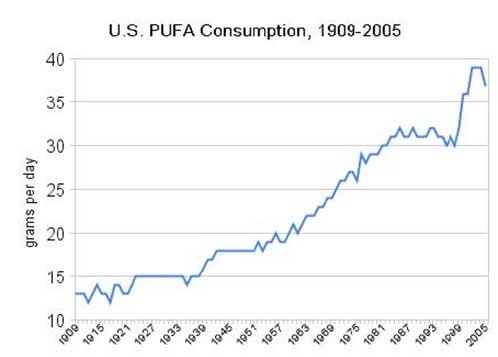The Science is Practically ( ( ( SCREAMING ) ) )
…Don’t Make This Trendy Fat Mistake By Dr. Mercola
THE SCIENCE IS LOUD AND CLEAR: the correct balance of fatty acids is essential if you want to be the healthiest you can be.
There are actually two problems related to how these fats are being consumed by most Westerners today:
Most people are consuming far too many omega-6 fats compared to omega-3 fats.
The ideal ratio of omega-3 to omega-6 fats is 1:1 (*VERY IMPORTANT IF YOU ACTUALLY WANT TO LOSE WEIGHT AND KEEP IT OFF & EVEN FASTER WITH COLD THERMALGENESIS CT = OMEGA FFA’s THE SOMATOSTATIN REGULATOR), but the typical Western diet is between 1:20 and 1:50.
*emphasis added by me!
The typical Westerner is consuming far too many polyunsaturated fats (PUFAs) altogether, which is a problem in and of itself.
So, most consume the wrong amount—AND the wrong ratio of these highly benefical fats.
Both omega-3 and omega-6 fats are PUFAs and they’re both essential to your health, but when omega-6 is consumed in excess, it become problematic.

Increase in American PUFA Consumption
From Stephan Guyenet’s Whole Health Source Blog
By far, the type of omega fats that most Westerners get too much of is the omega-6 variety, due to its prevalence in processed foods—and this is what’s driving up the line on the graph.
In order to help clear up the confusion, this article aims to provide you with a “primer” on fatty acids to increase your understanding of the fundamental differences between the types of fats and how your body uses them. So let’s start by taking a look at the overall category called “fats”—what they’re made of and what they do for you. And then we’ll take a closer look at PUFAs and omega-3s. …More
Fats vary in the length of their carbon chains, leading to another classification scheme based on their number of carbon pairs:
Short-chain fatty acids (SCFAs): Less than eight carbons
Medium-chain fatty acids (MCFAs): Eight to 14 carbons
Long-chain fatty acids (LCFAs): 16 or more carbons
Very-long-chain fatty acids (VLCFAs): More than 22 carbons
A fatty acid’s chain length and saturation control its melting point. As chain length increases, melting point increases. Likewise, fats that are solid at room temperature (butter, coconut oil) have longer chain lengths than fats that are liquid at room temperature (fish oil, olive oil). With chain lengths being equal, unsaturated fats have lower melting points than saturated fats.
Omega-3 Fats
Plant Based: The shorter-chain form of omega-3 is alpha-linolenic acid (ALA), the only omega-3 found in plants (except for some algae). Foods rich in ALA include flaxseed oil (53 percent), canola oil (11 percent), English walnuts (9 percent) and soybean oil (7 percent). ALA is considered essential because your body can’t make it, so you need it in your diet—or its long-chain derivatives.
Animal Based: The longer-chain forms of omega-3 are found mostly in animals and they are eicosapentaenoic and docosahexaenoic acids (EPA and DHA) and are highly unsaturated, mainly found in fish, shellfish and krill. DHA is the primary structural component of your brain and retina, and EPA is its precursor. Your body can make some EPA and DHA from short-chain ALA, but does so inefficiently. Recent studies suggest less than one percent of ALA is converted, if you are consuming the typical Western diet. DHA is found in cod liver oil, fatty fish, and in smaller concentrations in the organs and fats of land animals.
Omega-6 Fats
Shorter-chain: The shorter-chain form of omega-6 is linoleic acid (LA), which is the most prevalent PUFA in the Western diet, is abundant in corn oil, sunflower oil, soybean oil and canola oil.
Longer-chain: The longer-chain form of omega-6 is arachidonic acid (AA), which is an important constituent of cell membranes and a material your body uses to make substances that combat infection, regulate inflammation, promote blood clotting, and allow your cells to communicate. AA is found in liver, egg yolks, animal meats and seafood. …More


